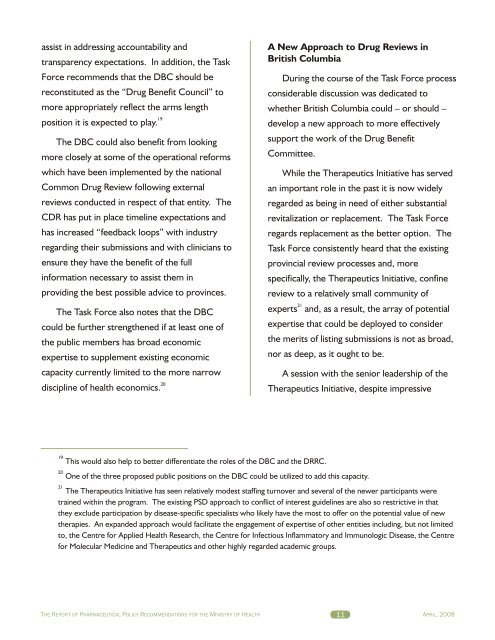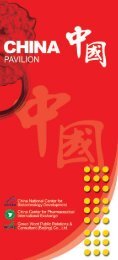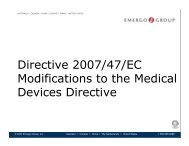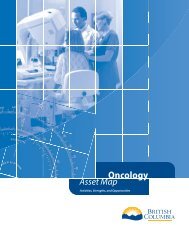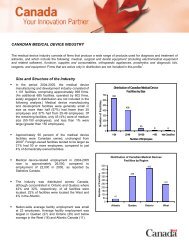Report - LifeSciences BC
Report - LifeSciences BC
Report - LifeSciences BC
- No tags were found...
You also want an ePaper? Increase the reach of your titles
YUMPU automatically turns print PDFs into web optimized ePapers that Google loves.
assist in addressing accountability andtransparency expectations. In addition, the TaskForce recommends that the D<strong>BC</strong> should bereconstituted as the “Drug Benefit Council” tomore appropriately reflect the arms length19position it is expected to play.The D<strong>BC</strong> could also benefit from lookingmore closely at some of the operational reformswhich have been implemented by the nationalCommon Drug Review following externalreviews conducted in respect of that entity. TheCDR has put in place timeline expectations andhas increased “feedback loops” with industryregarding their submissions and with clinicians toensure they have the benefit of the fullinformation necessary to assist them inproviding the best possible advice to provinces.The Task Force also notes that the D<strong>BC</strong>could be further strengthened if at least one ofthe public members has broad economicexpertise to supplement existing economiccapacity currently limited to the more narrow20discipline of health economics.A New Approach to Drug Reviews inBritish ColumbiaDuring the course of the Task Force processconsiderable discussion was dedicated towhether British Columbia could – or should –develop a new approach to more effectivelysupport the work of the Drug BenefitCommittee.While the Therapeutics Initiative has servedan important role in the past it is now widelyregarded as being in need of either substantialrevitalization or replacement. The Task Forceregards replacement as the better option. TheTask Force consistently heard that the existingprovincial review processes and, morespecifically, the Therapeutics Initiative, confinereview to a relatively small community of21experts and, as a result, the array of potentialexpertise that could be deployed to considerthe merits of listing submissions is not as broad,nor as deep, as it ought to be.A session with the senior leadership of theTherapeutics Initiative, despite impressive19This would also help to better differentiate the roles of the D<strong>BC</strong> and the DRRC.20One of the three proposed public positions on the D<strong>BC</strong> could be utilized to add this capacity.21The Therapeutics Initiative has seen relatively modest staffing turnover and several of the newer participants weretrained within the program. The existing PSD approach to conflict of interest guidelines are also so restrictive in thatthey exclude participation by disease-specific specialists who likely have the most to offer on the potential value of newtherapies. An expanded approach would facilitate the engagement of expertise of other entities including, but not limitedto, the Centre for Applied Health Research, the Centre for Infectious Inflammatory and Immunologic Disease, the Centrefor Molecular Medicine and Therapeutics and other highly regarded academic groups.THE REPORT OF PHARMACEUTICAL POLICY RECOMMENDATIONS FOR THE MINISTRY OF HEALTH 11 APRIL, 2008


